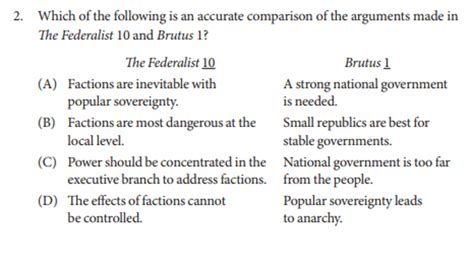Elevate Your Understanding of Government Concepts

Conceptual analysis is a crucial skill in AP Government, enabling students to critically examine political concepts and their interrelationships. By breaking down terms into their essential elements, students can gain a deeper understanding of the complex workings of government.
To enhance your comprehension, here’s a comprehensive collection of conceptual analysis practice questions that will challenge your thinking and prepare you for exam success.
**Essential Concepts of Government**
Power
- Define the concept of power and explain the different forms it can take in a political system.
- Compare and contrast coercive and persuasive power.
- Analyze the role of power in shaping decision-making in government.
Authority
- Differentiate between authority and power.
- Explain the different types of authority and how they are derived.
- Discuss the importance of legitimacy in maintaining authority.
Citizenship
- Define citizenship and list the rights and responsibilities associated with it.
- Analyze the factors that influence an individual’s sense of citizenship.
- Explore the challenges and opportunities for promoting active citizenship.
Political Ideology
- Explain the key tenets of liberalism, conservatism, and socialism.
- Analyze the ideological spectrum and identify the different positions on various political issues.
- Discuss the influence of political ideology on policymaking.
Federalism
- Define federalism and explain its advantages and disadvantages.
- Compare and contrast the different levels of government in a federal system.
- Analyze the allocation of power between the national, state, and local governments.
**Application and Analysis**
Questions:
- How does the concept of power relate to the American presidency?
- Analyze the role of authority in maintaining the rule of law.
- Explain how political ideology influences government spending priorities.
- Discuss the challenges and opportunities of promoting active citizenship in a diverse society.
- Evaluate the effectiveness of federalism in addressing national problems.
Tips for Answering:
- Start by defining the relevant concepts clearly.
- Provide specific examples from real-world events or historical contexts.
- Explain the interrelationships between different concepts.
- Support your answers with evidence from scholarly sources.
- Use precise language and avoid using overly general or vague terms.
**Tables for Reference**
Table 1: Forms of Power
| Power Type | Characteristics |
|---|---|
| Coercive | Based on threats or force |
| Persuasive | Based on reasoning, appeals, or charisma |
| Legitimate | Recognized by society as valid |
| Traditional | Based on historical norms or customs |
| Charismatic | Based on personal magnetism or authority |
Table 2: Levels of Government in a Federal System
| Government Level | Responsibilities | Examples |
|---|---|---|
| National | Foreign policy, defense, interstate commerce | US federal government |
| State | Education, public safety, health care | California state government |
| Local | City services, zoning, infrastructure | New York City government |
Table 3: Political Ideologies
| Ideology | Key Beliefs |
|---|---|
| Liberalism | Emphasizes individual rights, equality, free markets |
| Conservatism | Emphasizes tradition, stability, limited government |
| Socialism | Advocates for collective ownership of means of production and wealth distribution |
Table 4: Characteristics of Active Citizenship
| Feature | Description |
|---|---|
| Participation | Involvement in political processes, such as voting and campaigning |
| Knowledge | Understanding of government policies and current events |
| Responsibility | Fulfilling civic obligations, such as jury duty and paying taxes |
| Advocacy | Promoting political change through activism and community engagement |
